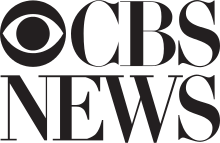John Dickerson (journalist)
| John Dickerson | |
|---|---|
 | |
| Born |
John Fredrick Dickerson Washington, D.C., United States |
| Education | University of Virginia |
| Occupation |
Moderator of Face The Nation CBS News Political Director |
John Frederick Dickerson (born 1968[1]) is an American journalist. He is the host of Face the Nation on CBS News, political director of CBS News and a political correspondent for Slate magazine. Before joining Slate, Dickerson covered politics at Time magazine for 12 years, serving the last four as White House correspondent.
Biography
A native of Washington, D.C., Dickerson is a son of C. Wyatt Dickerson and Nancy Dickerson Whitehead. He has three sisters and one brother. He grew up in McLean, Virginia at Merrywood, a Georgian-style mansion high on a leafy bluff overlooking the Potomac River.[2]
He graduated from Sidwell Friends School in 1987 and holds a degree in English with Distinction from the University of Virginia. On Her Trail,[3] Dickerson's book about his relationship with his late mother Nancy Dickerson Whitehead, a pioneering television newswoman, was published by Simon & Schuster in 2006.
Dickerson hosted Face the Nation three times in 2009 and was appointed Political Director of CBS News in November 2011.[4] He appeared each Wednesday on The Al Franken Show on Air America Radio, until the show ended in 2007, and was also a frequent guest on NPR's Day to Day. He appears on PBS's Washington Week and the Slate Political Gabfest, a weekly podcast with David Plotz and Emily Bazelon. Dickerson is also the host of Whistlestop, a Slate podcast about presidential campaign history.[5]
Dickerson took over as host of Face the Nation on June 7, 2015.
CIA leak case
Dickerson co-wrote a July 17, 2003, Time article, "A War on Wilson?", which attributed the leak of Valerie Plame's CIA identity to senior Bush administration officials. Writing for Slate in February 2006 ("Where's My Subpoena?"), Dickerson speculated about why Patrick Fitzgerald never called him as a grand jury witness for his "bit role" in the drama.[6]
On January 29, 2007, during the trial of Scooter Libby, former White House spokesman Ari Fleischer, testifying under an immunity agreement, named Dickerson as one of two reporters (the other was David Gregory of NBC)[7] to whom he revealed that Wilson's wife worked at the CIA on July 11, 2003, during a Presidential visit to Niger, three days before her name was published by columnist Robert Novak. Another reporter, Tamara Lipper of Newsweek, reportedly walked away before he spoke of Plame.[8] Dickerson has disputed Fleischer's account,[9] claiming that Fleischer urged him to look into who sent Wilson but that he did not mention Plame's name or CIA identity. In a second trial dispatch on the matter, Dickerson revealed a previously-undisclosed excerpt from his email that July afternoon which he said corroborated his account: "On background WH officials were dissing Wilson. They suggested he was sent on his mission by a low level person at the agency."[10] Neither Lipper nor Gregory has commented publicly about what Fleischer told them.
On January 31, 2007, former Time reporter Matthew Cooper testified that Dickerson's Africa sources contributed information to the article "A War on Wilson?"[11] In addition to Ari Fleischer, Dickerson also spoke to White House Communications Director Dan Bartlett while in Africa.[12]
Style
The Washington Post once wrote about his style of asking questions: “The master of the game is John Dickerson of Time magazine, who has knocked Bush off script so many times that his colleagues have coined a term for cleverly worded, seemingly harmless, but incisive questions: ‘Dickersonian.’”
- Dickerson (during April 13, 2004 press conference): “In the last campaign, you were asked a question about the biggest mistake you'd made in your life, and you used to like to joke that it was trading Sammy Sosa. You've looked back before 9/11 for what mistakes might have been made. After 9/11, what would your biggest mistake be, would you say, and what lessons have you learned from it?”
- President Bush: “I wish you would have given me this written question ahead of time, so I could plan for it.”[13]
On February 29, 2008, Senator Hillary Clinton released a "red phone" television ad suggesting that her opponent, Senator Barack Obama, was unprepared to be President. On a conference call with Clinton staff, Dickerson asked, "What foreign policy moment would you point to in Hillary's career where she's been tested by crisis?" The question prompted—according to The Hotline—a "pregnant pause" so long "you could've knit a sweater in the time it took the usually verbose team of Mark Penn, Howard Wolfson and Lee Feinstein, Clinton's national security director, to find a cogent answer."[14]
References
- ↑ John Dickerson
- ↑ Dickerson, John. "Growing Up in a Glamorous Neverland". New York Times. Retrieved November 11, 2013.
- ↑ "On Her Trail: My Mother, Nancy Dickerson, TV News' First Woman Star" by John Dickerson
- ↑ John Dickerson Named CBS News Political Director
- ↑ Slate, Whistlestop Podcast
- ↑ "Where's My Subpoena? Valerie Plame, Scooter Libby, and Me", Slate, February 7, 2006.
- ↑ National Review online, January 30, 2007
- ↑ Ari Fleischer testimony liveblogging, January 29, 2007
- ↑ John Dickerson Slate article on Fleischer testimony
- ↑ John Dickerson Slate article on Cooper testimony
- ↑ Matthew Cooper testimony liveblogging, January 31, 2007
- ↑ Wheeler, Marcy (2007). Anatomy of Deceit. Vaster Publications. pp. 58–59.
- ↑ Allen, Mike (December 1, 2001). "Next Question - Reporters Walk Line Between Deference and Diligence in Quizzing Bush". The Washington Post. Retrieved January 9, 2010.
- ↑ Skalka, Jennifer (February 29, 2008). "Hotline On Call". The Hotline. Retrieved May 12, 2012.
External links
|
